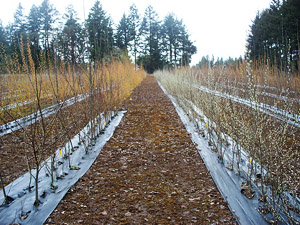Jul 1 2009
The potential of forest biotechnology to help address significant social and environmental issues is being "strangled at birth" by the rigid opposition of some groups and regulations that effectively preclude even the testing of genetically modified trees, scientists argue in a new report.
 Researchers at Oregon State University are doing numerous experiments with genetically modified poplar trees, designed to reduce the risks from gene movement in the environment
Researchers at Oregon State University are doing numerous experiments with genetically modified poplar trees, designed to reduce the risks from gene movement in the environment
Steps must be taken to create a regulatory environment that considers genetically modified trees on a scientific, case-by-case basis, and is focused on the end product rather than the process, say researchers from Oregon State University, Carnegie Mellon University and other institutions in an article in the journal Nature Biotechnology.
Lacking that, the potential will be lost to use this powerful tool to create trees that grow faster, better resist drought or disease, restore threatened species, reduce costs, contribute to renewable energy, sequester carbon, improve environmental cleanup, and produce badly needed products for global consumers, the scientists said.
"This is a noose that's been slowly tightening for many years," said Steven Strauss, a distinguished professor of forest biotechnology at OSU, and one of the world's leaders in the application of genetic science to forestry.
"Everyone wants safe and responsible regulations that protect the environment," Strauss said. "But some extreme opponents who see anything that is genetically modified as a mortal sin are successfully putting in place details that will make it virtually impossible to move ahead with genetic modification in forestry or woody energy crops.
"They don't even want to see field research," Strauss said, "which is required for analysis of ecological effects as well as benefits, and they have been making strides toward shutting the industry down."
Some major successes with biotechnology have taken place in crop agriculture, Strauss said, and because of the enormous benefits, that industry has learned to wade through the regulatory maze and bureaucratic hurdles in a number of countries, including the United States. By contrast, genetic modification studies in forest trees take longer, require work with more diverse species, and have larger environmental restrictions on research and application.
"Opponents are taking advantage of the well-intentioned but vague language in the Convention on Biological Diversity and the associated Cartagena Protocol to stimulate the imposition of regulations that make progress almost impossible," Strauss said. "They treat a small-scale research plot the same as use of a genetically-modified tree over an entire region."
And while earlier kinds of genetically modified trees almost exclusively contained genes from other species, many current advances are being made with native genes and natural growth processes, which are increasing as genomic science advances. No distinction is being allowed for that type of science, the researchers said.
The researchers said they believe that the convention has become a "platform for imposing broad restrictions on research and development of all types of transgenic trees regardless of their ecological and economic benefits."
This convention is one of the largest international treaties, first developed in 1992, and was initially designed to protect biodiversity, not preclude use of genetically modified organisms.
"The activism against genetically modified trees through the Convention on Biological Diversity has been against all forms of genetic modification, regardless of the goals or environmental benefits sought," the researchers wrote in their report. "This activism has also been in direct opposition to widespread scientific and professional opinion from around the world, including from ecologists, that the trait, not the recombinant method, should be the focus of assessments."
Another key part of the problem, the researchers said, is finding enough scientists to participate in contentious and time-consuming debates where "the quality of scientific discussions tend to be extremely low and highly combative."
The researchers believe that major changes in the structure and interpretation of the treaty are required to prevent its continued misuse in ways that they argue "is clearly against its original spirit and intent."